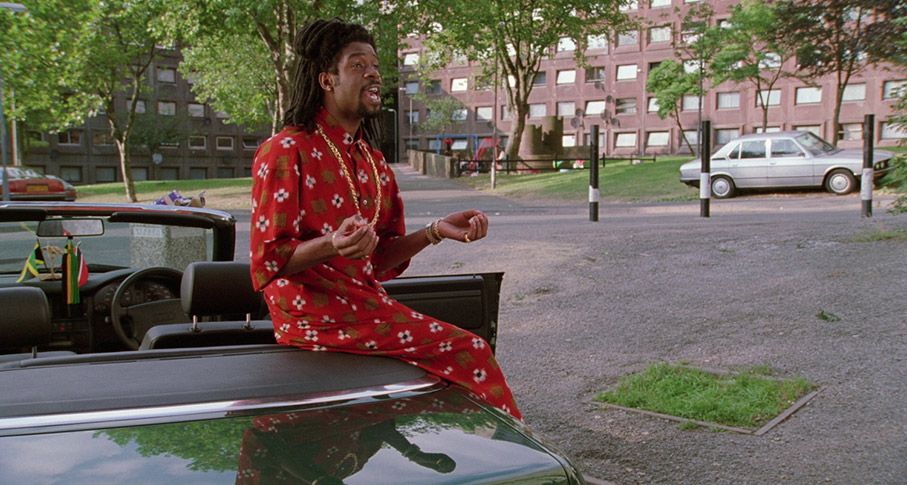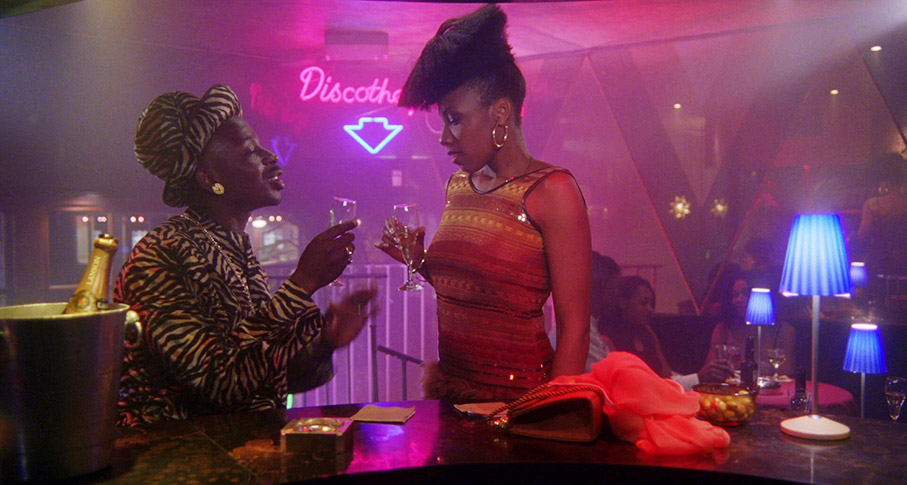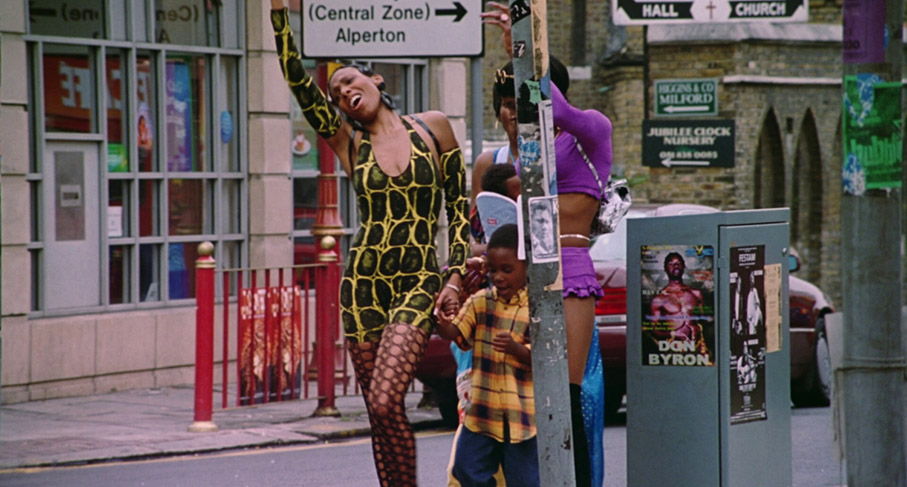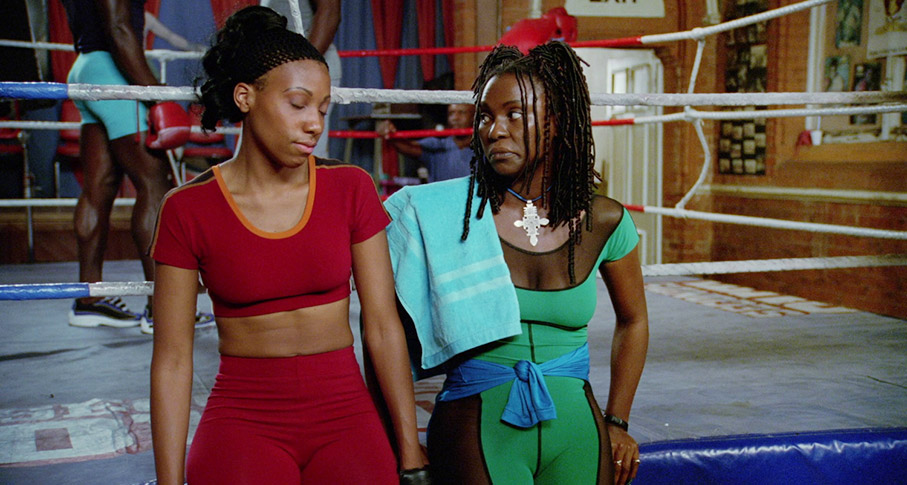|
Harlesden, north-west London, the late 1990s. Anita, Neeta for short (Anjela Lauren Smith) hangs out with her girl friends Yvette (Jocelyn Esein) and Sharon (Caroline Chikezie) and has ambitions for them to become stars at the local dancehall. However, she is “babymother” to two young children, and the babyfather Byron (Wil Johnson) is a singer with his own ambitions.
Babymother is energetic to a fault, and that’s obvious from the opening sequence, in which the credits appear over a slow-motion dance routine in the streets of Harlesden. In 1998, when it was first released, it must have looked and sounded very much now. More than two decades later it’s fresh and doesn’t seem dated, other than the obvious signifier divide between now and the last years of the twentieth century: no one has a smartphone or uses social media and there’s no mention of that new-fangled thing the internet.
Set in a mostly non-white area of the capital, Babymother is a film with an all-black credited cast: the only white faces you see are some extras. By 1998, that certainly wasn’t common. The first UK feature film by a black director was Pressure (1976), directed by Trinidad-born Horace Ové. Another was Burning an Illusion (1981), from the recently deceased Barbados-born Menelik Shabazz. Also significant was Black Joy (1977), again with a cast of mostly Caribbean descent, though directed by a white man, Anthony Simmons. However, Babymother is a musical, and that was something new. It’s also very much centred on young black women, with the men being largely secondary.

Writer/director Julian Henriques had made a first foray into this territory with a 1992 short film We the Ragamuffin (included among the extras on this disc), shot in Peckham with many of the local music scene playing themselves. The film premiered in Peckham as well, and was later shown on Channel 4. For Babymother, Henriques and his producer Parminder Vir (they are married, offscreen) looked to make something on a larger scale. Harlesden happened to be near where they lived and had been an important centre for black music since the arrival of immigrants from the Caribbean in the 1950s. There are many different styles of music featured in the film: reggae, dancehall, Lovers Rock, jungle and drum and bass, among others. Many of the cast were non-professionals, though among the older actors were well-known names like Don Warrington (as the promoter Luther) and Corrine Skinner Carter (as Neeta’s grandmother Mistress Edith). One of the non-professionals actually inspired part of the film: Diane Bailey had appeared in We the Ragamuffin and had told Henriques and Vir about her experiences of going to dancehalls with her girl friends, and that hanging out with them was more significant to her than the possibility of meeting men. Of the three leads, Anjela Lauren Smith was a Londoner born to Barbadian parents and Caroline Chikezie and Jocelyn Esein were both British Nigerian. Many a first-time feature director is paired with an experienced cinematographer, in this case Peter Middleton, whose career went back to 1969 and whose credits included Derek Jarman’s first three features.
Babymother was made on a budget of £2 million, with financing from Channel 4 and the Arts Council. Like many Film Four productions, it was given a cinema release before turning up on television. What strikes us now is that if it seemed new and fresh at the time, it now looks like a journey down a path not otherwise taken. It’s not as if there are plenty of other films like it, and Henriques and Vir have not made a feature film since, no doubt reflecting the difficulty in getting features made in the first place. However, Steve McQueen drew on his own experiences and memories of the music and an earlier time period in Lovers Rock, the second – and to my mind best – of his Small Axe quintet, and a vital part of it. But Babymother does have its place in British cinema, and Black British cinema specifically, and this Blu-ray release does affirm that place.
Babymother is a Blu-ray release from the BFI, encoded for Region B. The film has a 15 certificate.
The film was shot in 35mm, and was remastered for this release in 2K from the original camera negative. The transfer is in the intended ratio of 1.85:1. Babymother is a colourful film to say the least, and the transfer makes the most of Middleton’s cinematography, with bold colours and deep blacks.

The film was released in cinemas in Dolby Stereo, which is reflected in this disc’s soundtrack, rendered as LPCM 2.0. That plays in surround, which announces itself from the outset. It’s a busy mix. Reggae is a form of music whose pulse is eighth notes on the bass guitar, and consequently my subwoofer picked up a fair amount of low end, even though there’s no dedicated LFE channel.
English subtitles are available for the hard of hearing and, given the strong accents of many of the cast and the use of patois, may be useful to those who might struggle with that, or if English is not their first language. These subtitles are available on the feature only, not on the extras, but We the Ragamuffin has subtitles for almost all its dialogue as part of the film, in yellow.
We the Ragamuffin (25:43)
There is an argument to be made that, while it has plenty of music in it, Babymother is not actually a musical. All the music and singing in it is diegetic, with characters sometimes singing along to music actually playing in the scene. (See for example Lovers Rock, mentioned above, and its key sequence of partygoers singing along to Janet Kay’s hit single “Silly Games” and not always managing to hit some of the sometimes dog-botheringly high notes in it.) It doesn’t have any sequences of characters breaking out into song and dance numbers that could not have happened in real life. Babymother is a borderline case but We the Ragamuffin does fulfil that definition of a musical. In many ways, it feels now, in hindsight like Babymother in embryo, set in Peckham rather than Harlesden and a thin plot in between all the musical numbers. As mentioned above, the dialogue is almost wall-to-wall patois and has been subtitled in yellow. Whether that was a stipulation of Channel 4 or the wish of the filmmakers I don’t know.
The film is presented in 1.37:1 and if wasn’t shot in 16mm certainly looks it, from the grain onwards. It appears to have been transferred from a tape source, as a brief square appears top right just before the film ends, no doubt intended to cue the next commercial break on its Channel 4 broadcast.

We the Ragamuffin image gallery (7:34)
A self-navigating collection of stills (both colour and black and white), a one-page summary, a call sheet, the lyrics of Militant Dee’s (Diane Bailey) “The Gun”, a glossary of ragga rock terms, production notes, and the programme for the film’s premiere in Peckham. Oddly, given how musical the film is, this gallery proceeds in silence.
Interview with Julian Henriques and Parminder Vir (44:35)
Fortunately, while the film might be approaching its quarter-century, enough of the cast and crew are around to say their part. The couple are interviewed at the BFI Southbank in 2021 by Rōgan Graham, who remains offscreen. Henriques and Vir are clearly proud of their work on Babymother, if a little philosophical that it didn’t lead to more films of this kind, whether by themselves or others. Vir suggests that it Babymother is a film with a “long tail”, in that while it may have gone under the radar since its original release, it’s still there to be discovered by later audiences, some of whom will do that with the current Blu-ray.
Interview with Anjela Lauren Smith(49:03)
Smith is interviewed remotely by Corrina Antrobus, who is clearly a fan of the film. Smith says that she had had acting roles beforehand, but found it hard to be cast due to her race, and the fact that she had a young child then certainly didn’t help. She clearly has many happy memories of the shoot and the finished film, as one made about people like the ones she knew, in an area like the one where she herself grew up. She does regret that she was unable to keep most of the costumes Neeta wears in the film.
Interview with Caroll Thompson (31:33)
Also recorded remotely, Thompson is interviewed by Rōgan Graham. Thompson talks about her background in the various music styles featured in the film, and her role as the music supervisor.
Archive Q&A/Babymother gallery (28:15)
This is an audio recording of a Q&A by Henriques and Vir after a showing of Babymother at the National Film Theatre (as was) in September 1998. It plays over a gallery of production materials. The sound quality is a little rough: while those on stage can be heard clearly, questions from the audience often can’t.

Trailer (2:00)
A good attempt at selling the film in just two minutes. It begins with a card which will be an instant nostalgic fix for anyone of an age to be watching films regularly in cinemas in the late 1990s: “PG Trailer for 15 Film” with the then designs for those BBFC certificates present and correct.
Booklet
The BFI’s booklet (available in the first pressing only) runs to thirty-two pages. It begins with “Babymother: from ragga to riches” by Parminder Vir, now with an OBE and based in Lagos. She is clearly proud of a film which was, she begins by saying, listed as one of ten great black British films by the BFI. Her essay is a straightforward account of the film’s inception, its setting, the music and the cast. She ends by acknowledging the black British films which had come before Babymother, some of which I mention above and which appeared in the BFI’s list. This is followed by “A Rage in Harlesden” by the late Stuart Hall, originally published in Sight & Sound in 1998. Hall finds everything in the film to do with dancehall first rate, though he has reservations about other parts of it. Also in the booklet are full credits for Babymother, notes on and credits for the extras, and stills.
There weren’t many films like Babymother when it was made, and there haven’t been many since, but it’s a film with its place in history, in particular the history of black British films, and certainly worth a look on this new Blu-ray.
|